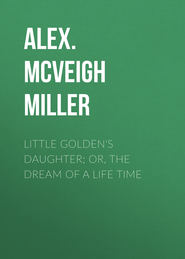По всем вопросам обращайтесь на: info@litportal.ru
(©) 2003-2024.
✖
Laurel Vane; or, The Girls' Conspiracy
Настройки чтения
Размер шрифта
Высота строк
Поля
"I—I was not frightened—only startled, sir," said Beatrix, faintly, as she stooped to recover her book.
She laid it upon the table and was about to leave the room when he stopped her with a slight wave of his gloved hand.
"Resume your seat, Miss Gordon. I shall not believe you are not frightened if you run away like this," he said.
She sat down with a gasp and waited. She had been full of vague fears and suspicions regarding his visit to New York. She waited with a beating heart and a pale face for his next words. He would say, with that fine scorn his mobile face was so capable of expressing:
"You are found out in your miserable conspiracy, Laurel Vane. You have come here pretending to be Mr. Gordon's daughter while you covered her elopement with her lover. The true Beatrix Gordon is far away, married to the man she has chosen, in defiance of her parents and friends. Punishment cannot reach her, but you, Laurel Vane, will have to suffer for the outrage you have helped to perpetrate on the Gordons and on us."
While she waited with a sick horror to hear him utter those words, she wondered vaguely what they would do to her for her share in Beatrix Gordon's conspiracy. Could they cast her into prison? She had seen the outside of a penitentiary once. How grim and dark and forbidding it looked with its iron doors and grated windows? Would they shut her up in all her youth and beauty in such a horrible place as that, and for how long? She shuddered as she thought that it might be for life. She had no idea, in her youth and innocence, how far and how long the powerful arm of the law could reach.
But the dreadful words for which she waited while a hand of ice seemed to grip her throat, remained unspoken.
Mr. Le Roy seated himself leisurely and drew off his dark kid gloves. Then he took up the volume she had been reading, and glanced at the title.
"I hope you have enjoyed your monopoly of my library," he said.
"Yes," she answered, faintly.
"And you are sorry I have returned to oust you from its enjoyments—aren't you?" he asked, studying her young face keenly.
"I should be very rude to say so," she answered, gaining courage as the dreadful charge for which she waited was delayed.
"As to that you cannot be ruder than I was in desiring you to stay out of this room while I was at home," he replied, with an air of insincerity. "Will you pardon my selfishness, Miss Gordon, and permit me to remove the embargo?"
She could scarcely believe her ears. His tone was distinctly kind. Had he, then, found out nothing? Was her secret safe yet a little longer?
Seeing that she hesitated, and did not speak, he continued:
"I give you carte blanche as to the use of this room whether I am absent or present. Will you come here whenever you choose, to read, or write, or study? You will not disturb me, neither shall I disturb you."
"Thank you," she murmured, not yet daring to look at him.
"You thank me, but you do not say you will come," he said. "Will you please to look at me a moment, Miss Gordon? I like to be looked at when I am talking."
With an effort she lifted her long fringed lashes, and forced herself to meet his proud, glittering dark eyes.
"I am a spoiled child. I like to be humored," he said, with a smile that lighted his face into a subtle sweetness that first showed her how dangerously fascinating the master of Eden could be when he willed. "I want you to tell me, Miss Gordon, that you forgive my selfishness the other day, and that you will come to this room as freely as to any other room in the house. You will promise me, will you not? No one ever refuses me anything!"
"There is nothing to forgive—you had a right"—she said, incoherently. "If there was—and mind, I do not admit there was—I forgive you freely."
"Thank you. And you will come?"
"Sometimes—perhaps," she stammered.
He pulled at his dark mustache impatiently.
"I must have a more definite promise than that," he said. "I am used to having my way about everything."
Though the words were arrogant, the tone was kind. He was thoroughly in earnest. She hesitated. She did not want to be drawn into such a promise, standing too much in awe of the stately master of Eden.
"You will not promise," he said, piqued. "Very well. But you are the first woman who ever refused a request of St. Leon Le Roy's. Your forgiveness was only half hearted."
He was more vexed than she knew. His wonderful condescension had not borne the fruit he expected. He leaned back in his chair with his elbow on the table, and pulled at his dark mustache with his shapely fingers, the costly diamond on his hand flashing luridly.
"What a stubborn little mite it is to refuse to humor me," he thought to himself in displeasure.
While the small object of his displeasure watched the door with longing eyes, yearning to escape from the oppressive dignity of his presence, she felt herself growing crimson under his cold, proud gaze.
"You have not asked me yet if I saw your parents," he said, after some minutes of that oppressive silence.
"It is coming now," thought the small culprit in despair, and she felt guiltily that the color was all fading out of her cheeks under those watchful eyes. She could only stammer, faintly, "Did you?"
To her infinite joy and relief, he answered in the negative.
"No, I did not see them. I called twice, but at both times they were out—once driving in the park, and again attending a reception."
"You do not look sorry, Miss Gordon, although it was purely out of courtesy to you that I went there."
"Indeed, I am very sorry," she murmured, but she could not make her face look so.
His words were so great a relief to her that she could not look disappointed. He did not tell her how disappointed he was. He would not have owned to himself that he had hoped to hear something about that lover from whom they had separated her. He would even have liked to have seen him. It was a new thing for the blasé, world-weary St. Leon Le Roy to feel curious over anything; but he had a great deal of curiosity over the man whom Beatrix Gordon loved.
"I should like to know if he is worthy of her," was his excuse to his own heart.
But he had not seen the Gordons, and he had found out nothing about their daughter's lover.
"If he is good and true and noble I should like to help the child to happiness," he said to himself. "If he is an ignoble fortune-hunter, as they say, I should most decidedly try to forward the Gordons' plot."
And it was rather curious that in his own mind he had quite decided that the unknown young man was a villain of the deepest dye. He pitied Beatrix for having fallen in love with a scamp who was only after her money. But as the days went by a change came over Beatrix that puzzled him.
Some of her shyness, her timidity, her sadness wore off. A look of contentment dawned on the fair face and in the dark eyes. Her cheeks gained color and roundness. She even laughed sometimes, a mellow laugh that was so sweet and glad it thrilled one's heart to hear it. Mrs. Le Roy was puzzled.
"She is certainly not pining for her lover," she said to her son. "At first she was so strange and sad I thought she was breaking her heart over him. But she is so young it is likely that change of scene has driven him completely out of her mind. The Gordons did well to send her here."
The day came when she changed her mind on that latter point.
In her heart Mrs. Le Roy had a secret fancy that the charms of her son had quite blotted out the image of Beatrix's absent lover from her young heart. Not that St. Leon or Beatrix gave her any reason to think so, but the wish was father to the thought. She would have been delighted if these two had fallen in love with each other, for the greatest desire of her heart was to see St. Leon married.
CHAPTER IX
In the private parlor of a neat hotel in a city not very far from New York, the true Beatrix Gordon was sitting one lovely morning awaiting the coming of her husband.
Although Beatrix had deceived and deserted her parents, and foisted an impostor on the aristocratic Le Roys, she looked positively and undeniably happy this bright summer morning. Her lovely blonde face, with its crown of soft golden hair, glowed with love and happiness, and her beauty was enhanced by her becoming morning-dress of soft pale blue with delicate trimmings of rich cream tinted lace.
The door opened suddenly, and Cyril Wentworth, her handsome young husband, entered with a letter in his hand. He kissed his fair young bride, and held the delicate envelope tantalizingly out of reach.
"At last!" cried young Mrs. Wentworth eagerly, and she sprung upon a chair and gayly possessed herself of her letter. "It is from my sweet little Laurel."











